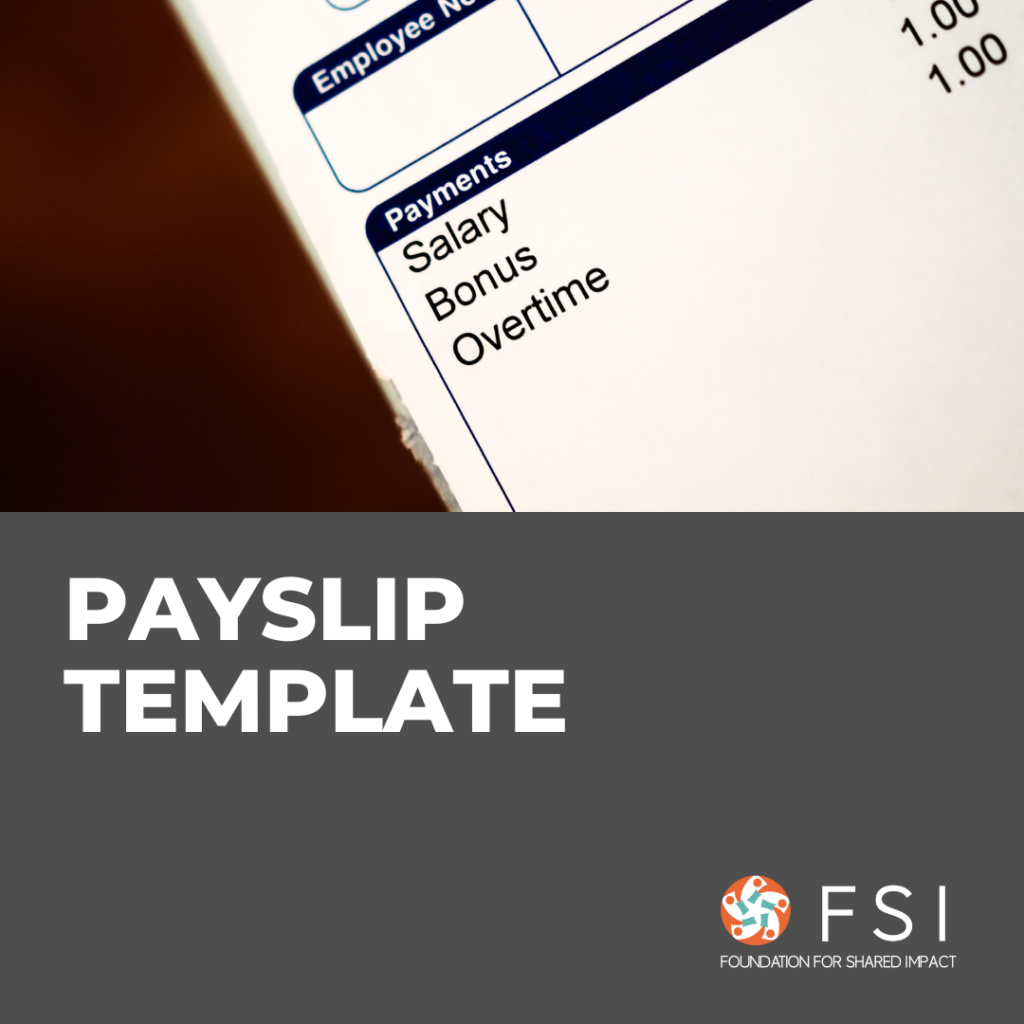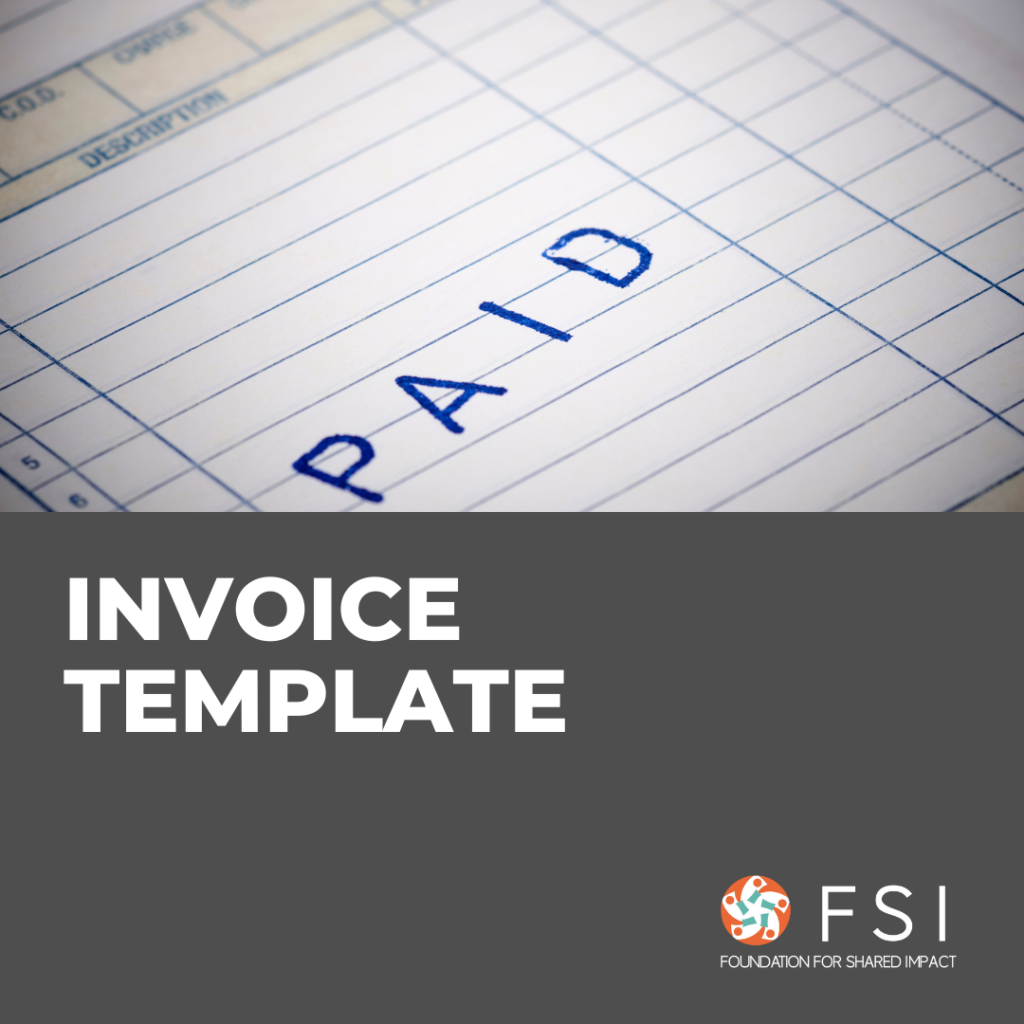Guide to Google Ads for Lead Generation
Need leads to drive your business? This beginner’s guide on Google Ads covers the core advertising campaigns that any service-providing business should have, covering Search Campaigns based on three different keyword groups (Generic Search, Own Brand, and Competitor’s Brand) and Display Campaigns.
If used effectively, your service will be able to reach a targeted audience in Hong Kong, and appear in the search results for people that are already actively looking for what you offer!
If you are running an E-commerce business, we recommend you to take a look at our guide on:
4 Must-Have Campaigns for Leads
#1 Generic Search Terms Campaign
Capture customers that search online
Generic Search works best for services that are in demand and thus frequently searched for. This should form the MAJORITY of your campaign strategy.
For example, let’s assume that you run a hair salon in Hong Kong. By using keywords that are relevant to your brand such as “Hair Treatment”, “Hair Solutions” or “Hair Loss Treatment”, a hair treatment center such as Perfect Hair can capture demand from the market. Most customer searches online do not have a specific brand in mind, making this a great way to capture demand when customers are searching for it.
- Advertisers pursuing this strategy are advised to create multiple generic search campaigns based on different service categories

Ad Extensions
Help users quickly understand what you offer by including Ad extensions in your Generic Search Campaign.
- From the image, Ad Extensions have Call to Action buttons such as “Book Now” or “Contact Us” and provide a quick way for users to find what they are looking for and sign up for your service.
- Use Lead Form Extensions to quickly get users to fill in a Google Form with their contact information.
- Use site link extensions to bring users into your booking page for easy sign-ups.
- Use one-click calling if you wish to be reached by phone to answer queries

Source: LeadsBridge
✅ Benefits:
- Reach a large audience pool to increase chances of gaining a sale
- Capture relevant customers that are actively searching for your specific service
- Gain new customers that don’t recognize your brand, they click on your website because of what you sell
❌ Disadvantages:
- Return On Ad Spend can range from low to high based on your Ad quality, the attractiveness of your product, and website quality
- Higher Cost Per Click (CPC) for broad search terms, may have to start off more niche, specific search terms to save on budget e.g. “Hair Loss Treatment”
#2 Branded Keywords Search Campaign
Include your company’s brand keywords in your campaign to establish a leadership position in the market
Putting money in to advertise keywords that include your company’s brand, such as “AIA”, “AIA Insurance”, or “AIA Life” for an insurance company like AIA, enables your brand to establish a leadership position and protects your brand from competitors. This ultimately leads to new incremental clicks and a greater clickthrough rate for individuals who search for your brand.

✅ Benefits:
- Extremely High ROAS (Return on Ad Spend), able to achieve up to 30x
- Very low CPC (cost per click)
- ~89% of Paid clicks are incremental according to a study by Google
❌ Disadvantages:
- Only captures those who are searching for your brand. Dependent on how well-known your brand is amongst your target audience.
#3 Competitor Keywords Search Campaign
Target your competitor’s brand keywords and take a larger market share
Putting in money to advertise using your competition brand terms (company brand) such as “Sleekflow Chatbot”, “Respond.io Chatbot”, “Freshworks Chatbot” for a WhatsApp Chatbot company like Chatalog, enables your brand to list first in Ad rank position when individuals search for a specific brand and can take high-intent customers from your competitors.
By listing first, competitors’ brands are perceived as weaker than yours by potential customers, which boosts your brand image. This strategy can take potential customers from your competitors, though at a higher price.
Example: Sleekflow (Messaging Platform) is bought out by their competitors Chatalog and Respond, causing the brand to rank last in Ad ranking.
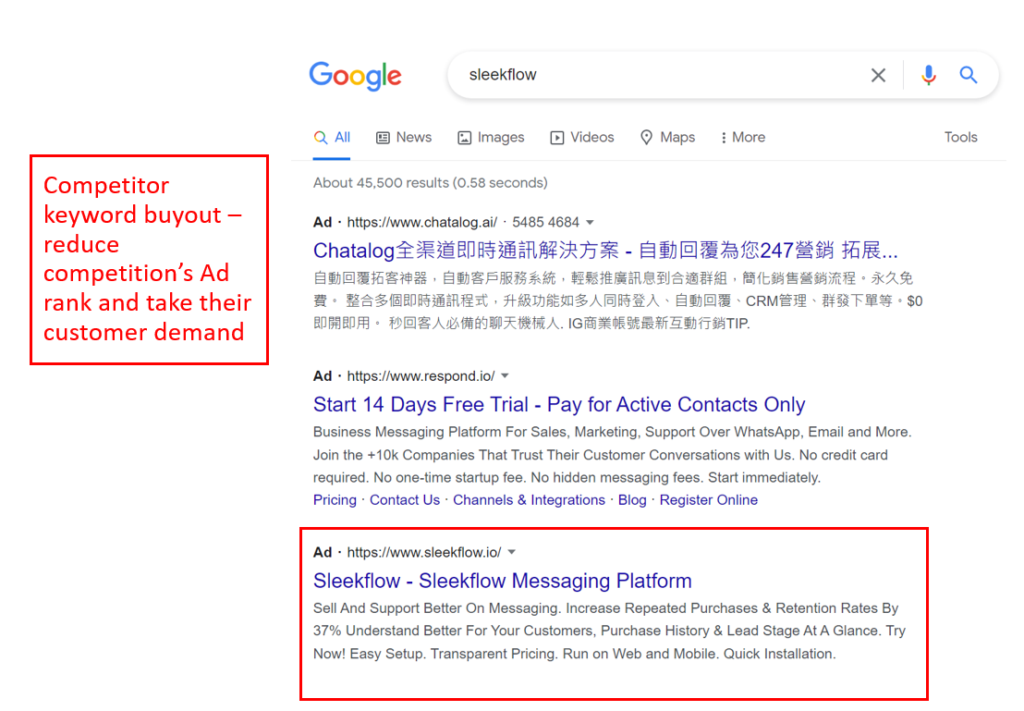
✅ Benefits:
- Gain Market Share over competitors – Capture high-intent customers who are actively searching for your competitor’s products
- Weaken competition brand image perception, establish yourself as a dominant brand
❌ Disadvantages:
- ROAS is not very high (Return on Ad Spend), as competitor Ads rank high in terms of relevance
- High Cost per Click (CPC)
- Only captures those who are searching for the competitor’s brand. Dependent on brand awareness (upper funnel campaigns).
#4 Display Campaign
Allocate a small ~10% budget for display campaigns to attract new audiences to use your service, serving visually engaging (photo) ads on the Google Display Network. The Display Network helps you reach people as they browse millions of websites, apps, and Google-owned properties (such as YouTube and Gmail)
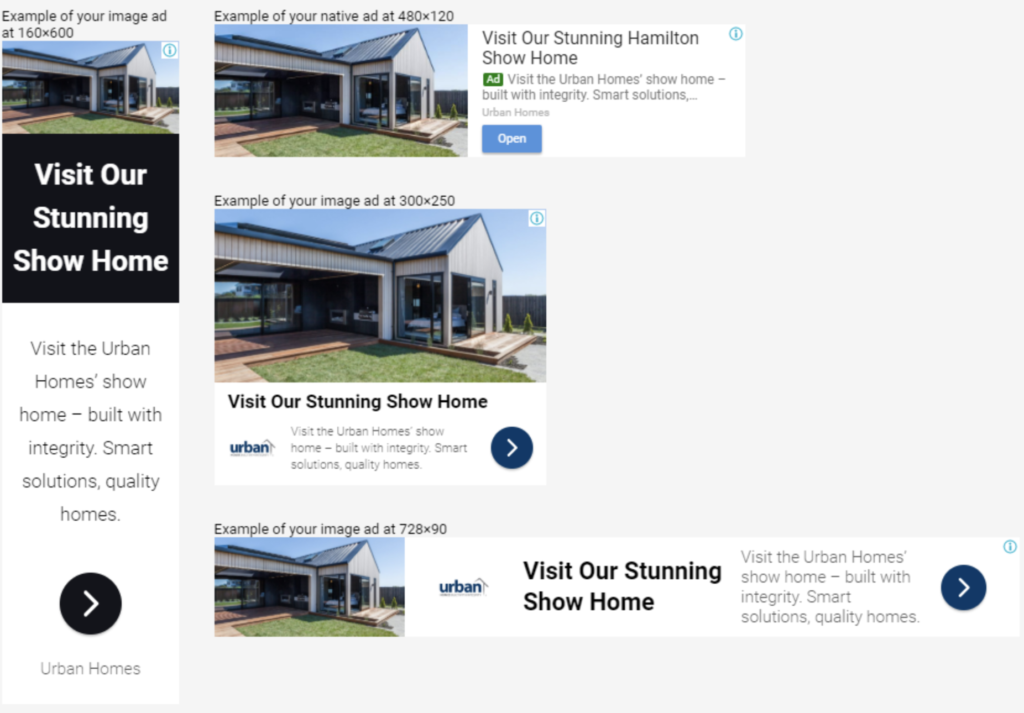
Responsive Display Ads
- Display Ads have ‘responsive’ features that show ads and banners in Google’s extremely wide display network.
- Automation: Google finds the best-performing Ad combinations from the multiple headlines and photos you have input
💡 For Display Ads, make sure you have a strong image that follows all requirements, with a compelling headline and a clear value prop in the description. When possible, try to use an image with a single subject, a natural composition, and square edges. Avoid overlaying logos or text.
✅ Benefits:
- Build Awareness for new audiences: Display ads are an upper funnel campaign that can bring in new leads
- Reconnect with existing audiences via retargeting: Display Ads can perform retargeting (e.g. target people who have previously clicked into your site) to get prospects down your funnel
❌ Disadvantages:
- Can expect lower ROAS (Return on Ad Spend) compared to Search campaigns
- Heavily dependent on high-quality photos to capture attention of users
(Optional) Discovery Campaigns
Discovery campaigns should be considered as the next step when budget increases to your other campaigns are no longer effective in capturing new additional audiences. It should take up a small ~10% budget.
Discovery campaigns reach people who are ready to discover and engage, compared to display campaigns that are for general awareness. This is listed as optional because the four types of campaigns listed above should take priority, especially #1 Generic Search Campaign which should use the majority of your budget.
- Reach up to 3 billion people monthly on YouTube Home and Watch Next feeds, Discover and the Gmail Promotions and Social tabs.
✅ Benefits: Improve Brand Consideration, Drive Engagement
❌ Disadvantages: Need high-quality images, Lower ROAS
Campaign Bidding Setup – Maximize Conversions
When setting up the campaigns mentioned above, Google Ads will ask for a bidding strategy.
It is recommended to set up Maximize Conversions for all your campaigns to increase the number of leads that arrive on your website. It optimizes the campaign to capture the largest amount of relevant audiences.
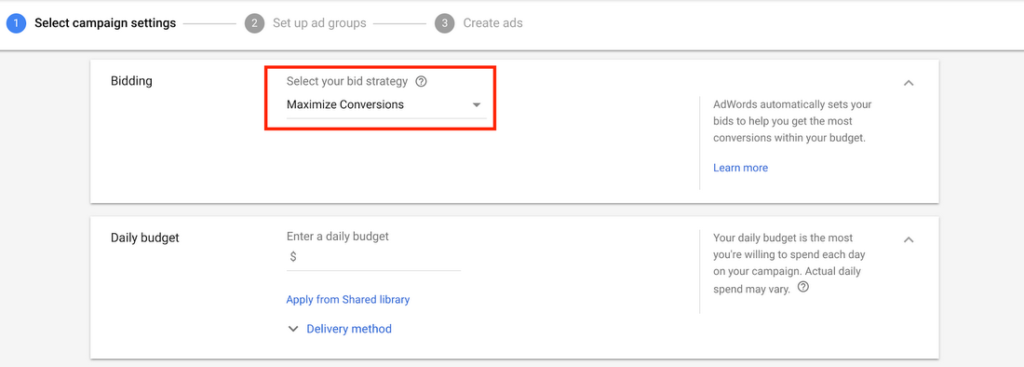
- Option to set Target CPA (Cost Per Action) It is advised to set a target CPA. Smart Bidding will try to get as many conversions as possible at the target CPA that you have set.
Summary of Campaigns for Leads
| Campaign | ✅ Benefits | ❌ Disadvantages |
| Generic Search | • Reach a large audience pool • Capture relevant customers • Gain new customers that don’t recognize your brand | • Return on Ad Spend can range from low to high • Higher Cost Per Click (CPC) for broad search terms |
| Branded Keyword Search | • Extremely High Return on Ad Spend • Very low cost per click • ~89% of Paid clicks are incremental | • Only captures those who are searching for your brand |
| Competition Keyword Search | • Gain Market Share over competitors • Weaken competition brand image perception | • ROAS is not very high • High Cost per Click • Only captures those who are searching for the competitor’s brand. |
| Display Ads | • Build Awareness for new audiences: • Reconnect with existing audiences via retargeting | • Can expect lower ROAS compared to Search • Heavily dependent on high-quality photos |


